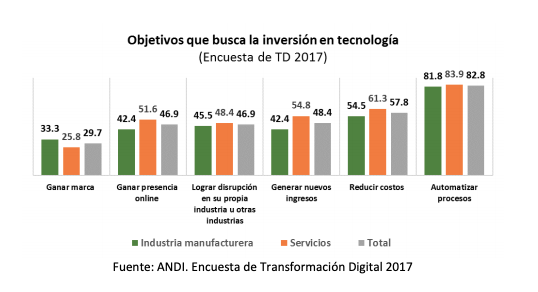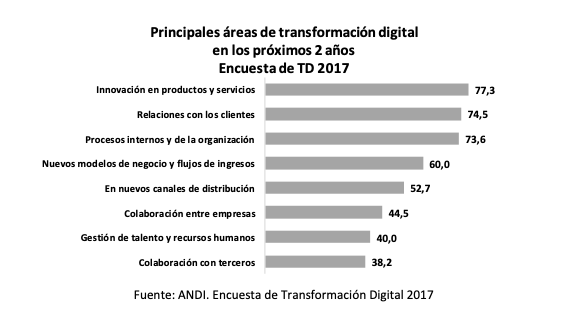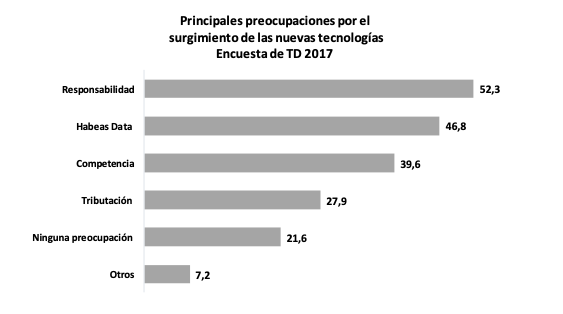Digital transformation is taking place in companies around the world. Today we will learn more about the situation in Latin America in this regard and, specifically, what is the situation in Colombia. We will see what steps are being taken by entrepreneurs and the government, and what obstacles are being encountered when it comes to implementing it.
Throughout history, we have experienced several industrial revolutions, which have been indispensable for the economic and technological progress of the entire world. Digital transformation is part of these innovation processes that allow us to continue to evolve and are applicable to all countries.
Today we will focus on the status of Colombia and its companies in the Colombia and its companies are in the process of adapting to the digital transformation and to and provide an overview of what has been achieved so far and what obstacles remain to be overcome and the obstacles that remain to be overcome.
Digital transformation in Latin America
Consulting firm Frost & Sullivan conducted a report in 2018 to gain an in-depth understanding of transformation across Latin America. According to its global vice president of digital transformation, Alpa Shah, companies in the region are “highly interested, with fintech, omnichannel marketing and API strategy being the main investments in the IT department.”
The main challenges identified by respondents were the ability to align IT with business strategies (30%), security concerns (26%), and strategies (30%), security concerns (26%) and network stability (26%). Within these security concerns, malware (51%) ranked first, followed by cybercrime and cybersecurity (51%), followed by cybercrime and espionage (49%) and cloud services (39%).
The reasons why the budget and investments in technology are increasing in the region are improving productivity (36%), increasing digital presence (33%) and reducing operating costs (31%).
In general terms, it can be seen that there is a real interest in digital transformation in Latin America and efforts are being made to overcome the difficulties encountered. With this, we now focus on the specific case of Colombia.
Digital transformation in Latin America
Among the initiatives being carried out to promote innovation and the development of the Colombian industry, highlights the Mega 2020 Commitment, promoted by the National Business Association of Colombia (ANDI). The objective of this plan is to make Colombia the most competitive country in the region.
This same association conducted a survey on digital transformation in the country, which helps us to know in greater depth the disposition of companies and the progress that has already been made in this direction.
The adoption of strategies to move from a traditional model to a digital one is gradually growing, with service companies being the ones that are adapting the most. Overall, 58.4% of entrepreneurs have already begun to implement a digital transformation strategy.

As to whetherbusiness owners believe their business will be more than 50% digital in the near future, almost three out of four believe it will be. Specifically, in the the service sector, the percentage is 85.7%.
Companies are fully aware of the importance of digital transformation: more than 98% consider it important to promote the use of emerging and digital technologies. The technologies most widely used in the services sector are cloud computing (78%), data mobile devices (68.3%), data analytics (65.9%), digital marketing (53.7%) and eCommerce (51.2%). These numbers demonstrate that the needs and expectations have become more sophisticated, more demanding and less patient.
Business Intelligence has been overtaken as the most widely used technology inprocesses in favor of cloud computing (80.2%), being relegated to the second position (74.5%), followed by mobile second place (74.5%), productivity tools (69.8%). On the other hand, the technologies that are in the technologies that are lagging behind are 3-D printing and omnichannel.
More than half of the surveyed entrepreneurs (58.9%) plan to or have already made investments in technology as part of their digital transformation, with this percentage being slightly higher in the services sector compared to the manufacturing industry.
In terms of investment amount, 49.2% plan to invest $50,000-100,000, while 30.2% are in the $100,000-500,000 range. The main reasons for making these investments are to automate processes (82.8%), reduce costs (57.8%) and generate new revenue (48.4%).

Digital transformation enables the creation of new business models and seeks to meet the increasingly demanding needs of consumers. But what are the main motivations for entrepreneurs to carry out this process? New business models (77.5%), customer expectations (66.7%) and new technologies (58.6%).
Respondents believe that digital transformation will have a greater impact in the next two years in product and service innovation (77.3%), the area of customer relationships (74.5%), the area of internal and organizational processes (73.6%) and the area of new business models and revenue streams (60%).

Entrepreneurs are in favor of the creation of new business models on the rise such as Netflix, Uber or Airbnb (almost three-quarters of respondents use them), and the vast majority (95.4%) consider it positive that they are emerging. On the other hand, 96.4% believe that the government should act and create a clear regulation on these new services.
What concerns entrepreneurs most about the emergence of these new technologies is liability (52.3%), user data management (46.8%) and competition (39.6%).

Once the need and benefits of digital transformation, entrepreneurs are faced with a number of barriers and challenges. These are lack of culture (74.1%), lack of knowledge (61.6%) and budget (56.3%).
When it comes to making these changes, it is important to have a leader to carry out this change of mentality, the ideal technology and talent, and to make decisions that move in the right direction. Half of the companies have a CIO(Chief Information Officer) or a CDO(Chief Digital Officer) to perform these tasks.
In short, Colombian entrepreneurs have already begun to take the first steps to adapt to this paradigm shift. Colombia is a country with a lot of potential, but it is especially in need of greater awareness of the importance of digital transformation in order to continue to progress digitally and economically.
